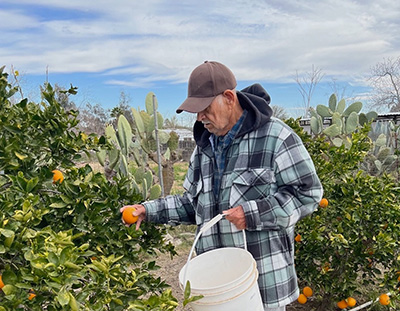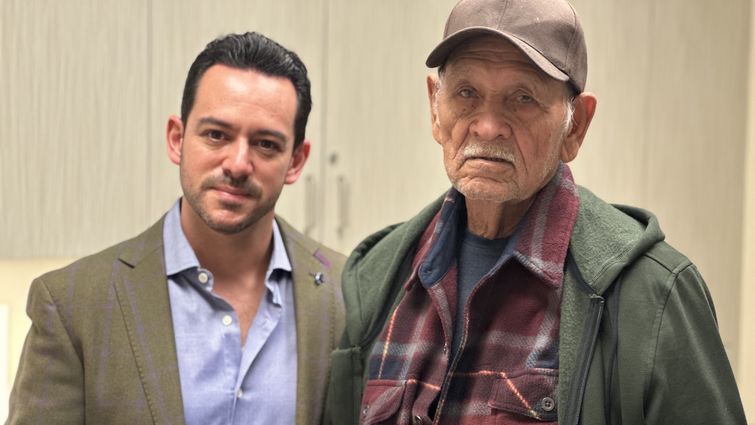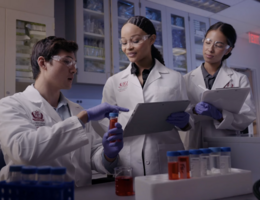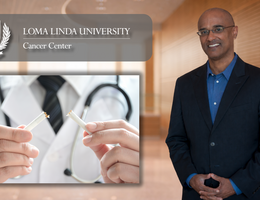

Luciano Dueñas Villafuente (right) is the first patient to receive the newly offered robotic Whipple procedure for pancreatic cancer at Loma Linda University Health performed by surgical oncologists including Dr. David Caba Molina (left).
Loving family and Loma Linda University Cancer Center’s care team members supported 84-year-old Luciano Dueñas Villafuente in his decision to undergo a Whipple procedure to treat his pancreatic cancer via robotic surgery. LLU Cancer Center is newly offering this less invasive approach to Whipple procedure that enables patients to recover faster than patients undergoing open surgery while still achieving the same outcomes.
Riverside resident Dueñas Villafuente was still recovering from a triple bypass heart surgery when he received the pancreatic cancer diagnosis; he says he was initially hesitant to undergo another taxing medical procedure.
Surgical oncologists David Caba Molina, MD, Michael O’Leary, MD, surgeon Nephtali Gomez, MD, and other care team members saw an opportunity for Dueñas Villafuente to benefit from a robotic version of Whipple. Dueñas Villafuente says he discussed his options with the doctors and understood that this operation could offer him a chance for cure with a rapid return to his daily routine.
“At first, I was afraid," says Dueñas Villafuente, as translated from Spanish by his son-in-law David Moreno. “But then I realized this procedure would give me an opportunity to live longer, or otherwise, I might not have had a chance at all.”
A Whipple procedure — also known as a pancreaticoduodenectomy — entails removing the head of the pancreas, a part of the stomach, the first part of the small intestine (duodenum), the gallbladder, and the bile duct. The operation is known in the medical community to be highly challenging, long, and complex, says surgical oncologist Caba Molina.
“In the world of surgery, when describing something difficult, they often liken it to a Whipple,” he says.
Caba Molina says LLU Cancer Center conducted extensive training and assembled a robotic Whipple team in preparation for eventually offering the procedure to many more patients.
“It has taken time for centers to adopt robotic Whipple because it is a high-risk, high-stakes operation that not everyone is willing to attempt,” he says. “But we know from experience that once surgeons learn how to perform Whipple robotically, the outcomes are the same as non-robotic Whipple and high center volumes can safely offer this procedure.”
Moreover, he says robotic Whipples hold advantages to open surgery for patients, including less invasion and blood loss, reduced bodily stress, and no need for feeding tubes.
During a robotic Whipple, a surgical oncologist’s hands control the movement of surgical instruments attached to a machine’s thin, robotic arms. The procedure leaves small two-inch incisions in the abdomen instead of the eight-inch scars associated with traditional Whipple.

After recovering from his procedure for a week in the hospital, Dueñas Villafuente returned home to his family. Five months later, he says he has more energy and plans to start a vegetable garden at his family home in Riverside. He says he also looks forward to traveling to Mexico to oversee his tree plantation of oranges and coconuts.
Dueñas Villafuente became the first patient to undergo the procedure at the hospital in November 2022. Since its first robotic Whipple, LLU Cancer Center has been one of few centers to offer the procedure in the Inland Empire — a service that Caba Molina said benefits the region's residents who need not travel to outlying counties to obtain the specialized level of care they need.
“We are proud to be able to add the Whipple procedure to the expanding repertoire of the other robotic surgeries offered at Loma Linda University Health,” he says.
Loma Linda University Health physicians and specialists can help answer your questions, decipher the clues your body may or may not be giving, or join you on your journey back to health. To learn more about all of the resources offered to patients at the Cancer Center, visit lluh.org/cancer-center or call 1-800-782-2623.


